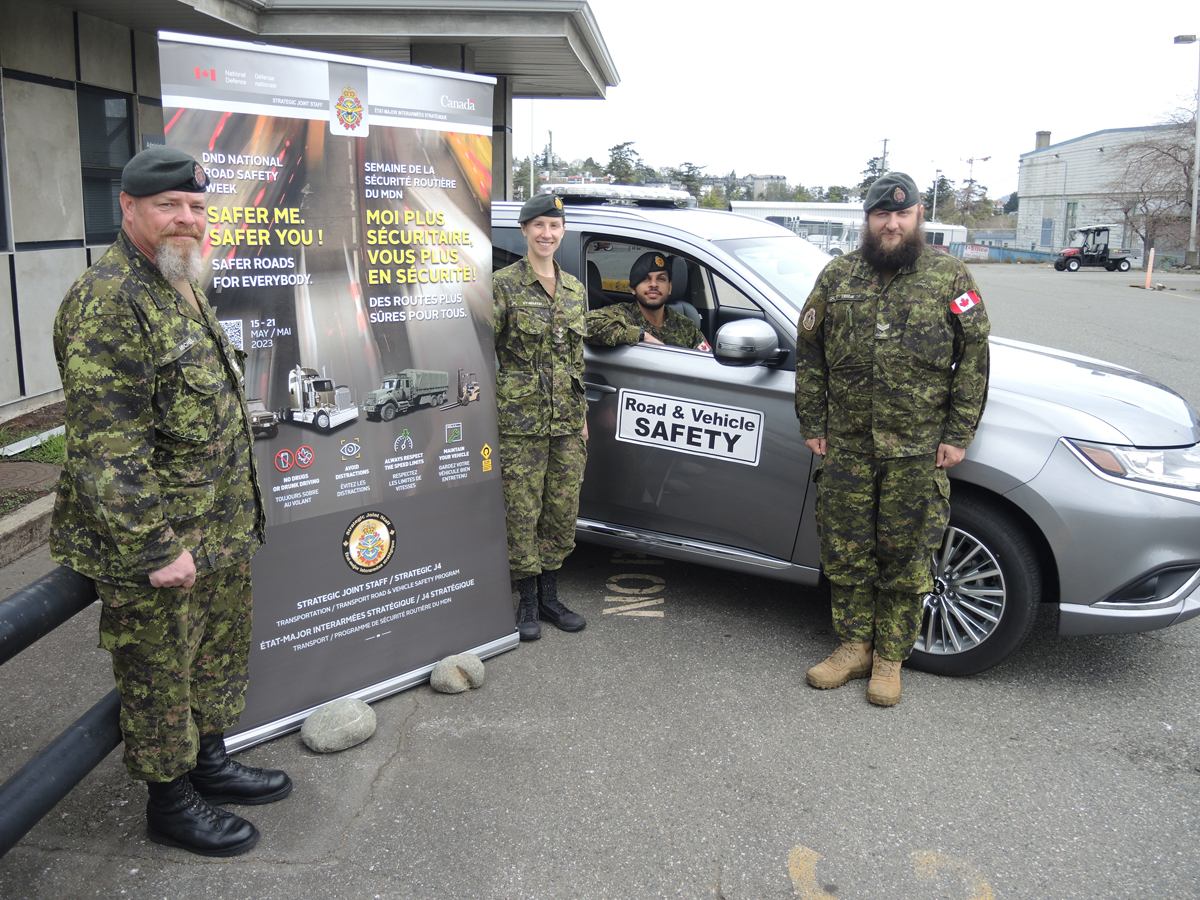TEME rolls out road safety campaign
By Lookout Production on May 19, 2023 with Comments 0

(Left) Master Warrant Officer Renaud Michel, Lieutenant Anabelle St-Martin, Second Lieutenant Naman Sharma and Corporal Trevor Leslie of TEME display this year’s Department of National Defence National Road Safety Week promotional poster at their Work Point headquarters, May 4. This year’s campaign titled “Safer Me, Safer You” runs May 15 to 21 Photo: Peter Mallett/Lookout Newspaper
Peter Mallett, Staff Writer — The slogan for this year’s Department of National Defence (DND) National Road Safety Week is simple and to the point: ‘Safer Me, Safer You’.
“The intention is to remind people that road safety is a shared responsibility and adopting safe driving habits is one of the most effective ways to make the roads safer,” says Corporal (Cpl) Trevor Leslie of the Transport Electrical and Mechanical Engineering Branch (TEME). “This campaign is designed for everyone who drives a vehicle at the Base, including military personnel and DND and civilian staff.”
Hosted by Road and Vehicle Safety at CFB Esquimalt, the campaign runs May 15-21 and intends to make roadways and travel safer for everyone who operates a DND vehicle.
Cpl Leslie, In-Command for Road and Vehicle Safety, hopes the message sinks in and drivers heed the advice. He is the primary instructor for safety and driving courses, handling collision reports and traffic infractions, and heading the Base’s licensing team.
His unit maintains a fleet of 753 vehicles for TEME, including cars, trucks, vans, buses, and special-purpose vehicles, including forklifts and tractor-trailers. He also oversees a staff of 51 drivers holding provincial driver’s licences in classes 5, 4, 2 and 1. Improving safety in the workplace and reducing injuries or fatalities from motor vehicle accidents is Cpl Leslie’s overall goal.
“Accidents can happen to even the most experienced drivers, especially when complacency comes in behind the wheel,” he says.
The easiest way to avoid accidents and injury is to use common sense; Cpl Leslie urges drivers always to be 100 per cent concentrated behind the wheel.
“The easiest thing to do to stay safe is to relax, slow down and pay attention to the rules and signage,” he says. “This also includes absolutely no cell phone usage while driving, conducting proper walk-around checks of your vehicle before you drive, and filling out all necessary paperwork when using a Government of Canada vehicle.”
Cpl Leslie advises drivers of several resources available to improve driving skills, such as logging on to the Defence Learning Network and completing the Safe Driving Course (SDC) or reviewing the ICBC Road Safety web portal: Road Safety (icbc.com). You can also contact Base Transport RVS for further information on Safe Driving and Licensing programs: +ESQ BLOG Road and Vehicle Safety@BLOG@Esquimalt.
ICBC Safety Tips
The Insurance Corporation of British Columbia Road Safety web page offers several tips on improving your driving habits and overall road safety. Here are a few key reasons why accidents and crashes happen:
Distracted Driving – Phones or anything that takes your attention away from driving can contribute to distracted driving. Even if you are not using a phone, you can still be distracted by it. You are 3.6 times more likely to crash using your hand-held phone.
Speed – Speeding is one of the leading causes of car-crash fatalities in B.C. The faster you go, the longer it takes to stop, and the more dangerous a crash can be. Keep yourself safe by slowing down, keeping your distance, and passing with care.
High-risk Driving – Following too closely and failing to yield are two of the most common high-risk driving behaviours. Other high-risk driving includes ignoring traffic control devices and improper passing. Don’t count on others to obey the rules of the road or make allowances for you, especially if you are taking dangerous risks.
Source: ICBC
Filed Under: Top Stories
About the Author:





